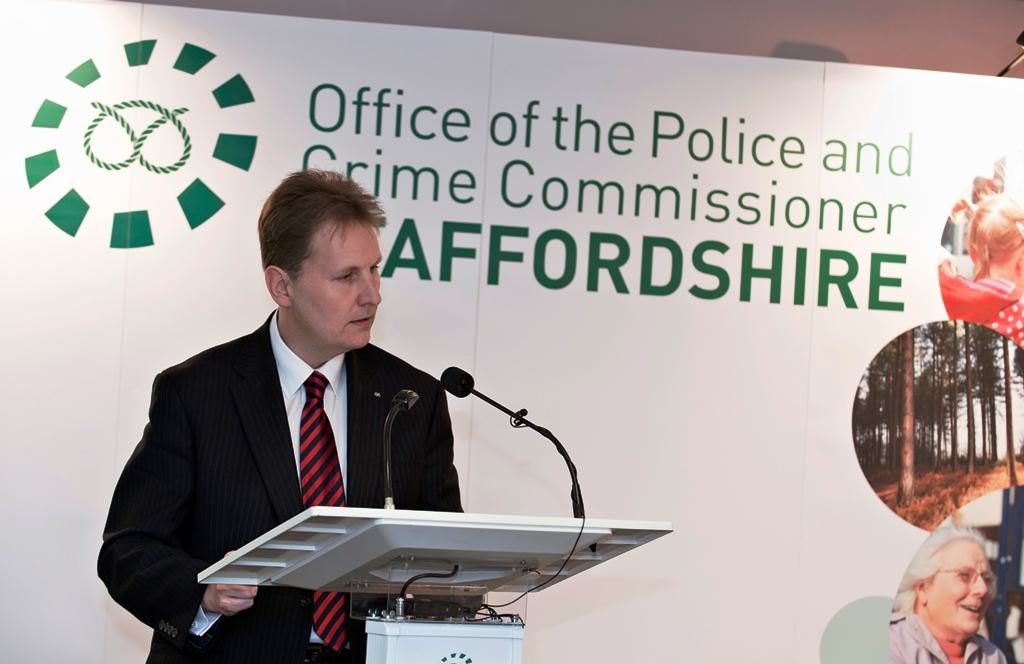The Police and Crime Commissioner (PCC) for Staffordshire has welcomed the findings of a national Report by Parliament’s Home Affairs Select Committee into the role and effectiveness of PCCs eighteen months after they were elected across the country.
The document suggests that the effectiveness of PCCs varies from area to area but that the public profile and engagement with local people around policing and criminal justice has improved considerably compared with the previous Police Authorities that PCCs replaced.
In the progress report the committee highlighted the exceptionally low turn-out for PCC elections and the lack of public knowledge about the role of PCCs in November 2012. This according to one poll has now turned full circle into increased public awareness with 62 per cent of people now aware of the work of their PCC. This compares to less than seven per cent of people aware of the old Police Authorities after over 40 years of existence.
The Home Affairs Committee Report is thorough. Evidence from over 30 witnesses from PCCs and Chief Constables to think tanks and other interested bodiesmeans they have achieved a rounded view of what’s working and what might need change.
Matthew Ellis, who took up Office in December 2012, said the fifty six page document was a fair assessment almost all of which he agreed with.
He said: “I can’t disagree with anything of substance in the Report. It reinforces that the PCC role has the potential to drive important changes in policing and wider but that it’s early days and there are some changes needed, particularly in holding PCCs to account via better resourcing of the scrutiny arrangements.
“I also strongly support the principle of a stronger audit trail and clearer process where PCCs want to remove a serving Chief Constable although ultimately with that further need for transparency in place it must remain the PCC’s decision.
“I’m particularly pleased, and relieved, the committee dismissed out of hand claims made by ex Metropolitan Police Chief, Lord Stevens, that PCC’s ability to remove Chief Constables would adversely affect their operational independence. HASC made clear that there was no evidence to support his assertion.”
The committee comments that the commissioner’s role is still being defined; it’s complex but has enormous potential to act as the honest broker bringing disparate services together towards common goals and outcomes.
Matthew Ellis added: “Developing better joined up working between police and other agencies is critical to improving services and reducing crime further. It should be at the heart of every PCC’s plans and aspirations. In Staffordshire it’s an area of work that’s gathering pace and starting to make a difference on the ground as well as being fundamental to the improved budget position here.”
Opening up policing to greater public scrutiny and challenge than ever before, is also recognised by the committee as moving in the right direction across most of the country.
Mr Ellis said: “Here in Staffordshire we’re re-engaging local people with policing and helping to drive openness. That’s why I’ve set up the new independent Ethics, Transparency and Audit Panel (ETA). I’m also establishing local independent versions of that panel that will be an opportunity for communities to hold their local police commanders to account, and influence local priorities, more so than in decades.
He continues: “But this scale of change isn’t easy and much of the report suggests that the difference between areas where things are going well and where they aren’t is significant. In my view too many PCCs are either ineffective or out of their depth. The stark reality is that, cross political parties and independents, there are those who are up to the job as well as some elected in 2012 who simply aren’t.
“Democracy brings that at all levels from PMs to Councillors and in the case of PCCs a poorly delivered electoral process nationally left people bewildered about what it was all about and opened the door for scepticism from the media, particularly nationally.
“The elections seem a lifetime ago to me. The PCC brand is recovering and I agree with the report’s comment that it’s ‘on probation’. That was a phrase used by a PCC during evidence to the committee and I think he’s bang on.
“But one thing is clear and that is that I and all other PCCs will be judged by what’s achieved and nothing else.”



